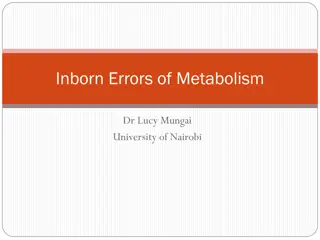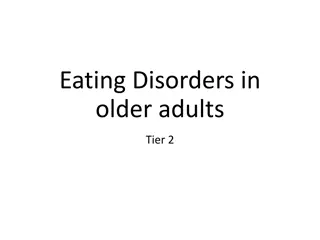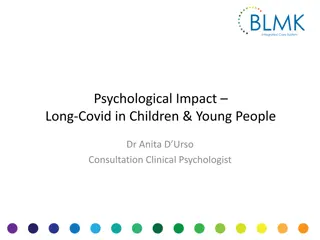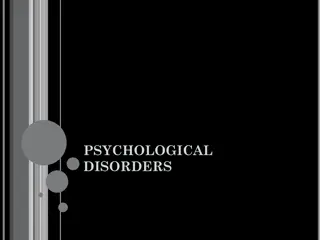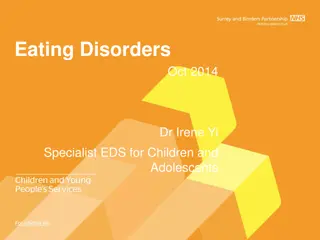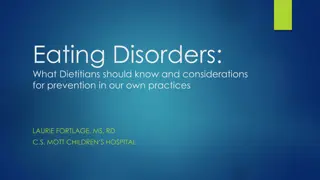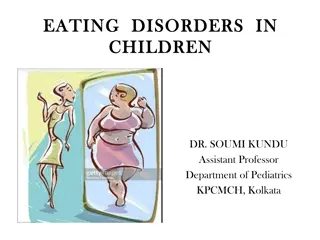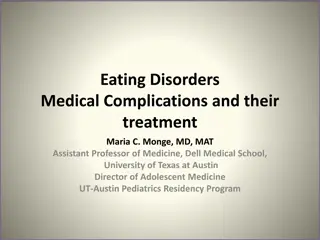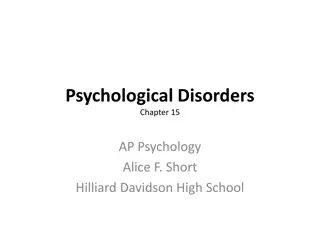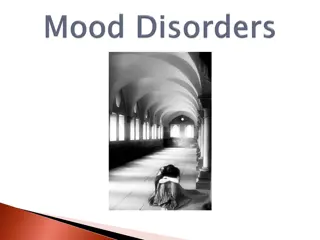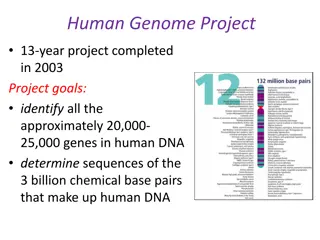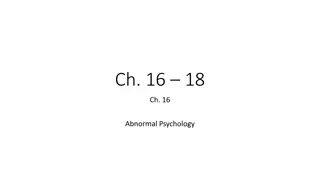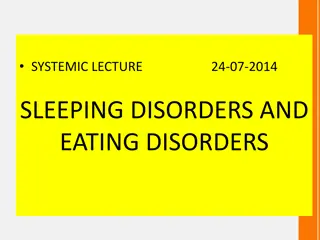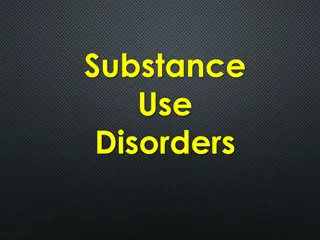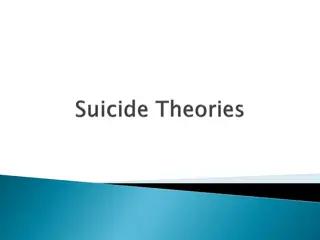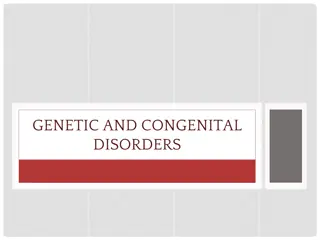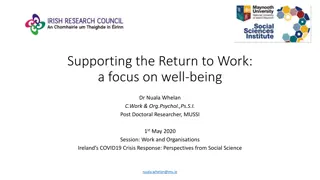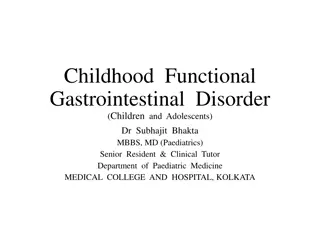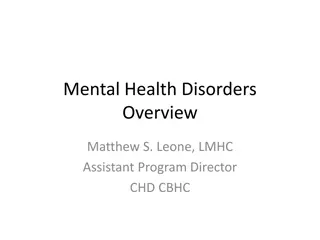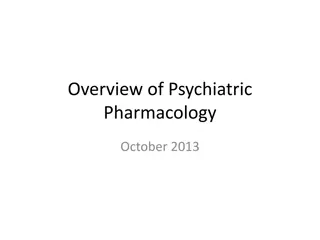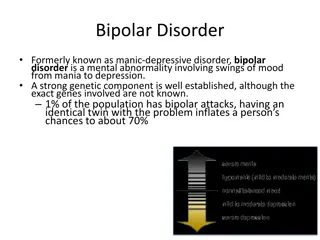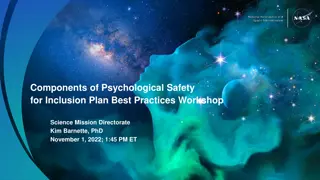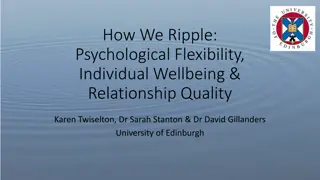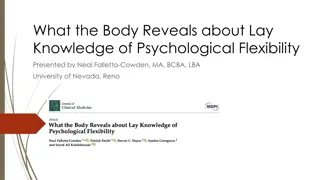Understanding Psychological Claims in the Workplace
Exploring the rise of psychological claims in work comp, this information covers types of mental stress claims, psychological claim regulations by state, standards of causation for physical injury-mental stress and mental stress-mental stress, as well as examples of how work-related stress can impac
1 views • 22 slides
Responsibilities in Ensuring Psychological Health and Safety
The primary duty of care under the WHS Act 2011 encompasses physical and psychological health. Non-compliance can lead to significant penalties, including fines and imprisonment. To address psychological impacts, implementing strategies like ALGEE from Mental Health First Aid Australia can help redu
0 views • 8 slides
Overview of Human Genetic Disorders
Human genetic disorders encompass a range of conditions, from recessive disorders like cystic fibrosis to dominant disorders such as Huntington's disease. Examples include cystic fibrosis, Huntington's disease, and sickle-cell anemia. Understanding genetic disorders involves research and awareness o
0 views • 10 slides
Overview of Anxiety and Related Disorders
Anxiety disorders, such as PTSD, panic disorders, phobias, agoraphobia, and OCD, are characterized by varying degrees of fear and distress. Anxiety is a normal response to danger, but when it becomes chronic, it can lead to debilitating conditions. PTSD occurs post-trauma, panic disorders involve in
1 views • 42 slides
Understanding Somatic Symptom Disorders, Conversion Disorders, and Dissociative Disorders
Somatic symptom disorders manifest as physical symptoms without apparent cause, while conversion disorders involve specific physical symptoms incompatible with medical conditions. Illness anxiety disorder involves interpreting normal sensations as disease symptoms. Dissociative disorders lead to a s
1 views • 41 slides
Unbound Minds Psychological Clinic For Children And Adolescent | Book Now
Unbound Minds Psychological Clinic, is a top-notch psychological clinic, we dedicated genuine & best psychological treatment with professional team. Get certified treatment with more benefits. Hire our experienced psychologist and get rid of stress a
1 views • 2 slides
Theories of Causation in Psychological and Social Sciences
Overview of theories of causation categorized into psychological, social psychological, and sociological perspectives. Psychological theories focus on instinctive, biological, and psychological qualities of abusers, including Attachment Theory, Psychodynamic Theory, Social Learning Theory, and Situa
0 views • 15 slides
Understanding Inborn Errors of Metabolism and Metabolic Disorders
Inborn Errors of Metabolism (IEM) are genetic disorders that disrupt metabolic pathways, leading to substrate accumulation or product deficiency. These disorders can be classified based on toxic accumulation, protein metabolism, carbohydrate intolerance, lysosomal storage issues, energy production d
0 views • 29 slides
Understanding Co-occurring Mental and Physical Health Conditions
Co-occurring mental and physical health disorders are prevalent and require an integrative multidisciplinary approach for effective assessment and treatment. This holistic approach helps address the complexity of managing multiple disorders in an integrated healthcare setting. Through a multi-direct
1 views • 37 slides
Understanding Eating Disorders in Older Adults
Eating disorders can affect older adults too, yet they are often overlooked or misdiagnosed. Challenges in diagnosing these disorders arise from various underlying health conditions. Types of eating disorders include anorexia nervosa, bulimia nervosa, binge eating disorder, and others. Recognizing c
0 views • 7 slides
Understanding Functional GI Disorders: A Comprehensive Overview
Functional GI disorders encompass a range of conditions affecting the gastrointestinal system, such as irritable bowel syndrome and disorders of the gut-brain interaction. These disorders are characterized by no structural abnormalities but are influenced by factors like motility disturbance, viscer
0 views • 42 slides
Understanding Genetic Disorders and Their Impact on Health
Genetic disorders are caused by abnormalities in genes or chromosomes, leading to various health conditions. Inherited disorders can be passed down from parents to children, affecting physical makeup and processes in the body. In India, there is a high prevalence of genetic disorders, particularly i
1 views • 12 slides
Psychological Impact of Long Covid in Children and Young People
Psychological impact of Long Covid in children and young people includes sleep problems, worsening of pre-existing psychiatric symptoms, emotional distress like depression and anxiety, and mixed results in terms of quality of life and resilience. Beyond physical symptoms, psychological effects such
2 views • 5 slides
Understanding Psychological Disorders and Diagnosis
Explore key concepts like the medical model applied to abnormal behavior, criteria of abnormal behavior, stereotypes of psychological disorders, psychodiagnosis, prevalence of psychological disorders, and a specific focus on anxiety disorders such as generalized anxiety disorder. Learn about differe
0 views • 35 slides
Enhancing Sports Performance Through Psychological Skill Training
Sports psychology delves into the psychological factors affecting athletic performance, emphasizing the importance of Psychological Skills Training (PST) to equip athletes with mental skills tailored to their individual needs. These skills techniques help in enhancing self-confidence, goal-setting,
0 views • 29 slides
Understanding Eating Disorders: Types, Signs, Effects, and Recovery
Eating disorders are mental disorders characterized by unhealthy eating habits and can have severe physical and psychological consequences. This article explores the definition of eating disorders, signs to look out for, different types such as Anorexia Nervosa, Bulimia Nervosa, Pica, and Purging Di
0 views • 10 slides
Understanding Eating Disorders in Children and Adolescents: Insights from Dr. Irene Yi
This comprehensive presentation by Dr. Irene Yi delves into eating disorders, including Anorexia Nervosa and Bulimia, in children and adolescents. The content covers types of eating disorders, developmental perspectives, assessment stages, and management strategies. NICE guidelines for managing eati
0 views • 25 slides
Understanding Eating Disorders: Insights for Dietitians
Eating disorders are complex neurobiological conditions that are not merely about control or weight management. These disorders can affect individuals of all genders, body sizes, and socioeconomic backgrounds. Dietitians play a crucial role in identifying, assessing, and treating eating disorders, a
0 views • 41 slides
Understanding Eating Disorders in Children by Dr. Soumi Kundu
Eating disorders in children, such as anorexia nervosa, bulimia nervosa, and binge eating disorder, are complex biopsychosocial disorders characterized by dysfunctional patterns of cognition and weight control behaviors. They result in significant physical, psychological, and social complications. T
0 views • 34 slides
Understanding Eating Disorders: Medical Complications and Treatment
This presentation by Dr. Maria C. Monge covers the common eating disorders in teenage patients, potential medical complications, and the role of the medical team in treatment. It includes definitions of disorders like Anorexia Nervosa, Bulimia Nervosa, and Binge Eating Disorder according to DSM-5 cr
0 views • 60 slides
Understanding Neurodevelopmental Disorders in Childhood and Adolescence
Neurodevelopmental disorders in childhood and adolescence encompass a range of conditions including intellectual disabilities, communication disorders, autism spectrum disorder, and attention deficit/hyperactivity disorder. These disorders impact cognitive development, adaptive functioning, and comm
0 views • 30 slides
Understanding Sleep Disorders: Classification and Diagnosis
Sleep disorders encompass various conditions affecting sleep patterns and quality. They are classified into categories such as insomnia, sleep-related breathing disorders, central disorders of hypersomnolence, circadian rhythm sleep-wake disorders, parasomnias, and sleep-related movement disorders.
0 views • 32 slides
Understanding Psychological Disorders: Theoretical Approaches and Abnormal Behavior
Explore the realm of psychological disorders through theoretical approaches such as the Biological, Psychological, and Sociocultural models. Delve into the complexities of abnormal behavior, including definitions and examples. Gain insights into the impact of biological, psychological, and sociocult
0 views • 47 slides
Understanding Grief and Depressive Disorders: A Comparative Analysis
Grief and depressive disorders share similarities but also have distinct differences. Grief is a universal emotional state following loss, while depressive disorders involve prolonged mood disturbances. The stages of grief include denial, anger, bargaining, depression, and acceptance, with intervent
0 views • 79 slides
Understanding Genetic Disorders and the Human Genome Project
The Human Genome Project, completed in 2003, aimed to identify all human genes and DNA sequences. Genetic disorders, like autosomal disorders and Huntington's disease, can result from mutations at different levels, affecting single genes, chromosomes, or multiple genes. Albinism and cystic fibrosis
0 views • 37 slides
Understanding Abnormal Psychology: Disorders, Symptoms, and Treatments
Explore the world of abnormal psychology through the lens of different disorders like depression, anxiety, and phobias. Learn about the definitions of abnormal behavior, DSM-V classifications, and various types of psychological disorders. Delve into the complexities of mental health conditions such
0 views • 39 slides
Understanding Sleeping Disorders and Eating Disorders: A Systemic Lecture
Explore the stages of sleep, from drowsiness to deep sleep, and learn about non-organic sleep disorders that are primarily psychogenic in nature. Dive into the classifications of sleep disorders based on emotional causes, including dyssomnias and parasomnias. Discover the characteristics of REM slee
0 views • 54 slides
Understanding Substance Use Disorders and Associated Factors
Substance use disorders encompass conditions arising from the abuse of alcohol, psychoactive drugs, and other chemicals, leading to physical and psychological dependencies with withdrawal symptoms upon cessation. Psychological factors such as inferiority complex and poor impulse control, along with
0 views • 42 slides
Significance of Psychological Theories in Understanding Suicidal Behavior
Psychological theories play a crucial role in guiding research, clinical work, and the development of new hypotheses related to suicidal behavior. The Interpersonal-Psychological Theory of Suicidal Behavior emphasizes social forces, such as disturbed regulation of individuals by society, social inte
0 views • 14 slides
Overview of Classification of Psychiatric Disorders
Psychiatric disorders are illnesses with various manifestations that impact functioning due to disturbances in biological, social, genetic, and other factors. Two key classification systems, ICD-10 and DSM-5, categorize over 200 types of psychiatric illnesses. The ICD-10 includes categories like org
0 views • 18 slides
Overview of Genetic and Congenital Disorders and Their Causes
Explore the terminology, causes, characteristics, and results of genetic and congenital disorders, as well as the disorders of single-gene inheritance. Learn about autosomal dominant disorders like Marfan Syndrome and Neurofibromatosis. Discover how single-gene disorders are inherited and their impa
0 views • 24 slides
Supporting Well-Being for Return to Work Amidst COVID-19 Crisis: Focus on Psychological Health
Amidst the challenges of returning to work post-COVID-19, it is essential to prioritize well-being and psychological health for a successful transition. Dr. Nuala Whelan's research sheds light on the impact of unemployment, emphasizing the need for support in job matching, upskilling, and psychologi
0 views • 9 slides
Understanding Childhood Functional Gastrointestinal Disorders
Functional Gastrointestinal Disorders (FGIDs) in children and adolescents are characterized by chronic or recurring symptoms that cannot be fully explained by current structural or biochemical tests. These disorders emphasize the role of normal development in symptom presentation and the lack of evi
0 views • 46 slides
The Relationship Between Cognitive Flexibility and Psychological Flexibility After Acquired Brain Injury
This study explores how cognitive flexibility and psychological flexibility interact after an acquired brain injury. It examines whether individuals who exhibit cognitive inflexibility can achieve psychological flexibility, considering the impact of cognitive impairments post-injury. Cognitive flexi
0 views • 21 slides
Understanding Mental Health Disorders and Their Impact
Mental health disorders are prevalent, affecting 1 in 5 adults in the U.S. each year. They can significantly impair various aspects of life and lead to severe consequences, including high costs, hospitalizations, homelessness, and incarceration. Factors contributing to mental illness vary from biolo
0 views • 54 slides
Overview of Psychiatric Pharmacology: A Comprehensive Guide from 2013
This presentation delves into the nuances of psychiatric pharmacology, exploring common psychiatric conditions, historical perspectives on medical treatments, categories of psychiatric medications, and principles of treatment. It also touches on mental illness definitions from DSM-IV-TR and DSM-V, a
0 views • 27 slides
Understanding Mental Health Disorders: Bipolar Disorder, Anxiety Disorders, & More
Exploring various mental health disorders such as Bipolar Disorder, Anxiety Disorders, Generalized Anxiety Disorder, Panic Disorder, and Phobic Disorders. Learn about their symptoms, prevalence, and impacts on individuals' lives.
0 views • 41 slides
Understanding Psychological Safety for Inclusive Environments
This presentation explores the components of psychological safety according to current research, emphasizing its role in fostering inclusive environments. It delves into the NASA Science Strategic Approach, defines psychological safety based on Dr. Timothy Clark's 4-stage model, discusses team psych
0 views • 11 slides
Psychological Flexibility and Relationship Quality Study
This study explores the relationship between psychological flexibility, individual wellbeing, and relationship quality. It reveals correlations between psychological flexibility, positive affect, negative affect, satisfaction with life, psychological wellbeing, and relationship quality in romantic r
0 views • 18 slides
Understanding Psychological Flexibility through Embodied Knowledge
Psychological flexibility plays a crucial role in mental well-being and behavior. This study explores whether untrained individuals can grasp psychological flexibility concepts based on body language and how people physically express flexibility or inflexibility in response to challenging situations
0 views • 18 slides







